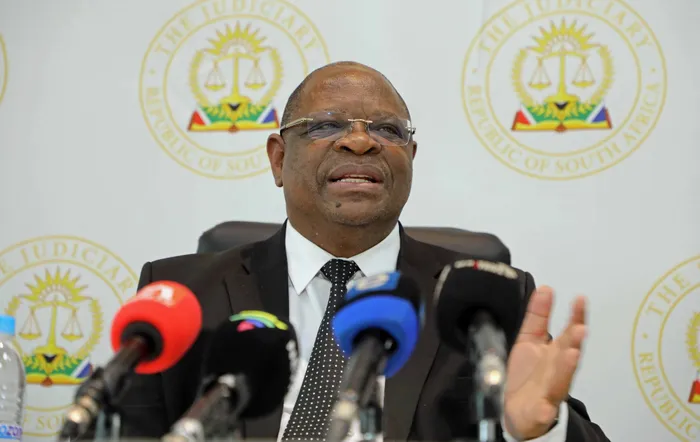South Africa: Cabinet’s lacklustre action against corruption

Picture: Timothy Bernard African News Agency (ANA) – Chief Justice Zondo calls for “the establishment of a single, multifunctional, properly resourced and independent anti-corruption authority” in the State Capture Commission Report, the writer says.
By Paul Hoffman SC
This question is important because serious corruption is strangling the life out of constitutional democracy under the rule of law in SA. It is imperilling all human rights and especially those rights aimed at poverty alleviation, education and healthcare. Conversion of public money into loot is no way in which to deliver all of the advances offered in the Bill of Rights.
So what is cabinet doing?
Nothing?
Treading water, kicking for touch, playing the ever so long waiting game, protecting the scot- free cadres who share loot with the ANC, and seeking advice that is not needed and ignoring an instruction from the NEC of the ANC on the topic?
Here are some facts, some words from within the cabinet and from those who know:
*When President Cyril Ramaphosa triumphed at the ANC elective conference in December 2017, he said: “corruption must be fought with the same intensity and purpose that we fight poverty, unemployment and inequality.” The party would “act fearlessly” against the “abuse of office”, he vowed. Only, nearly five years later, the sun still hasn’t risen on this “new dawn”.
- Mavuso Msimang, ANC grandee, explains: "The fact is, the security forces meant to police corruption are themselves often corrupt, or occupied by incompetents. As it is, [January 2022] the minister of police isn’t speaking to the commissioner of police — and one of them must go, so that policing doesn’t collapse. It is the president who must make that decision." He did, eventually.
- Karam Singh of Corruption Watch: “The principles for fixing our public procurement system were laid out in the national anti-corruption strategy, which was developed in November 2020 but never executed,” he says. “But a start would be to create a real independent anti-corruption agency.”
- By August 2020, it seemed as if the ANC had finally seen the light. Justice minister Ronald Lamola said at the time that “it’s clear, as a country, we need a permanent structure” that is truly independent to fight corruption. Critically, though, Lamola didn’t commit to timelines, and said the discussion was “ongoing”.
- On 4 August 2020 the NEC of the ANC announced its views on reform of the criminal justice administration: “The NEC called upon the ANC-led government to urgently establish a permanent multi-disciplinary agency to deal with all cases of white-collar crime, organised crime and corruption. Furthermore, the NEC called upon all law enforcement agencies to carry out their duties without fear, favour or prejudice,” is how the Citizen newspaper reported it.
- Chief Justice Zondo calls for “the establishment of a single, multifunctional, properly resourced and independent anti-corruption authority” in the State Capture Commission Report.
- In June 2022 the members of the Constitutional Review Committee of the National Assembly (an ANC dominated body) unanimously resolved to invite Accountability Now to make a comprehensive presentation to it on the topic of establishing a new Chapter Nine body to prevent, combat, investigate and prosecute serious corruption in SA. A written submission has been presented already and a date for oral representations is awaited.
- In August 2022 Justice minister Ronald Lamola has let it be known that the national cabinet is not considering the establishment of a new anti-corruption body under chapter 9 of the constitution. This announcement is unfortunate. The discussion that was “ongoing” in 2020 is now not going on in 2022.
- As from 1 September 2022 a National Anti-Corruption Advisory Council will serve for three years to advise on reform. Its mandate does not appear to include what the president had in mind when he first announced the NACAC idea in his 2021 SONA:
Dramatically diverting from the prepared text he emphasised that the intention was to create a new anti-corruption statutory body that reports to Parliament: “Not to the executive!” mark you.
Accountability Now has been advocating proper compliance with the law on anti-corruption machinery of state, as laid down in the Glenister litigation, since 2012. A draft of suggested enabling legislation and a constitutional amendment to accommodate its proposed Chapter Nine body (and to improve the independence of the NPA) has been available to government since August 2021.
It would appear that only cabinet is out of step with the main opposition parties, the NEC of the ANC and many leading lights in civil society on the need to reform the criminal justice administration to enable it to counter serious corruption effectively and efficiently.
The Defend our Democracy campaign endorses the reforms advocated by Accountability Now and has called upon civil society organisations to do likewise.
The rulings of the Constitutional Court in the Glenister litigation have the force of law and bind government to implement them. This implies that a failure to do so entitles the National Assembly to insist on proper implementation. It also allows any public interest litigant aggrieved by the failure to protect human rights and honour international anti-corruption obligations of the state to litigate the matter by drawing the attention of the Constitutional Court to the non-compliance with its rulings in the context of a case in which declaratory, mandatory and supervisory relief is sought.
The tension between the resolution of the NEC of the ANC and the cabinet stance will presumably play out when the ANC holds its elective conference in December 2022. If new brooms are elected to sweep clean, well and good, if not the litigation option becomes irresistible to all right-thinking South Africans.
Hoffman is a Director at Accountability Now
This article is original to the The African. To republish, see terms and conditions.